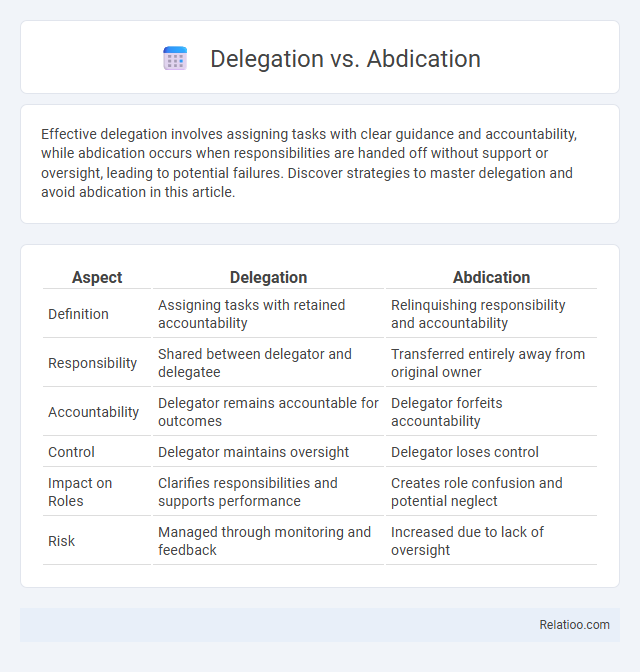Effective delegation involves assigning tasks with clear guidance and accountability, while abdication occurs when responsibilities are handed off without support or oversight, leading to potential failures. Discover strategies to master delegation and avoid abdication in this article.
Table of Comparison
| Aspect | Delegation | Abdication |
|---|---|---|
| Definition | Assigning tasks with retained accountability | Relinquishing responsibility and accountability |
| Responsibility | Shared between delegator and delegatee | Transferred entirely away from original owner |
| Accountability | Delegator remains accountable for outcomes | Delegator forfeits accountability |
| Control | Delegator maintains oversight | Delegator loses control |
| Impact on Roles | Clarifies responsibilities and supports performance | Creates role confusion and potential neglect |
| Risk | Managed through monitoring and feedback | Increased due to lack of oversight |
Understanding Delegation and Abdication
Understanding delegation involves assigning tasks and authority to others while maintaining responsibility and oversight, ensuring your goals are met effectively. Abdication occurs when you relinquish all control and responsibility, often leading to a lack of accountability and potential failure in achieving desired outcomes. Proper delegation balances empowerment with accountability, making it crucial for your leadership success.
Key Differences Between Delegation and Abdication
Delegation involves assigning tasks while retaining responsibility and oversight, ensuring your team has clear guidance and accountability. Abdication occurs when authority or responsibility is transferred entirely without supervision, leading to potential neglect of duties. Understanding these differences helps you maintain control and drive performance without relinquishing essential leadership roles.
Why Effective Delegation Matters
Effective delegation empowers teams by distributing responsibilities according to individual strengths, enhancing productivity and accountability. Unlike abdication, where leaders relinquish control without oversight, effective delegation maintains clear communication, direction, and support throughout the task lifecycle. Mastering delegation fosters skill development, boosts morale, and drives organizational success by ensuring tasks are completed efficiently and goals are met.
The Risks of Abdication in Leadership
Abdication in leadership presents significant risks, including loss of control, diminished accountability, and erosion of team trust, which can lead to operational failures and decreased morale. Unlike delegation, which involves assigning tasks while retaining oversight and responsibility, abdication signals a complete relinquishment of authority, undermining effective decision-making and strategic direction. Leaders who abdicate risk creating confusion, inconsistent outcomes, and disengagement among employees, threatening overall organizational performance.
Signs You’re Abdicating, Not Delegating
Signs you're abdicating, not delegating, include relinquishing responsibility without oversight, failing to provide clear instructions, and avoiding accountability for outcomes. When you delegate effectively, you assign tasks while maintaining authority, offering guidance and support to ensure success. Abdication leaves your team directionless, undermining progress and your leadership role in your organization.
How to Delegate Roles and Responsibilities Successfully
Successful delegation requires clearly defining roles and responsibilities to ensure accountability and avoid confusion between delegation and abdication. You must communicate expectations, provide necessary resources, and trust your team while maintaining oversight through regular check-ins. Effective delegation empowers your team, drives productivity, and prevents the pitfalls of abdication, where responsibilities are abandoned rather than assigned.
Building Trust Through Proper Delegation
Building trust through proper delegation requires clarity in roles and responsibilities, ensuring that tasks are assigned with the right level of authority and support. Your team members need clear guidance and accountability to avoid the pitfalls of abdication, where leaders relinquish responsibility without oversight. Effective delegation empowers employees, fosters trust, and enhances productivity by balancing autonomy with ongoing leadership involvement.
Common Mistakes in Delegation vs Abdication
Common mistakes in delegation include unclear instructions and lack of accountability, leading to confusion and reduced productivity. Abdication often occurs when leaders completely relinquish responsibility without oversight, resulting in unmanaged tasks and diminished control. Understanding the distinction helps prevent ineffective delegation, ensuring tasks are assigned with proper authority and follow-up.
Strategies for Avoiding Abdication
Effective delegation involves assigning tasks with clear expectations and appropriate authority, ensuring accountability without relinquishing overall responsibility. Strategies for avoiding abdication include maintaining oversight, providing guidance, and establishing regular check-ins to track progress and offer support. Empowering team members while retaining decision-making control prevents abdication and promotes balanced leadership.
Developing a Delegation Mindset for Leaders
Developing a delegation mindset for leaders involves understanding the crucial difference between delegation and abdication to enhance productivity and team growth effectively. Delegation empowers your team by assigning responsibility while maintaining accountability, whereas abdication relinquishes control without oversight, leading to potential failures. Embracing a strategic delegation approach sharpens leadership skills, fosters trust, and optimizes resource management, ultimately driving organizational success.

Infographic: Delegation vs Abdication
 relatioo.com
relatioo.com